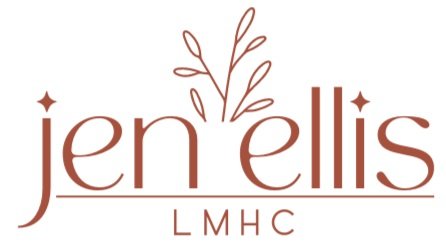about me
~ I’m a late-diagnosed AuDHD human and have lived experience with mental health struggles. It has taken me many years to accept myself. My hope is to give you the space to do the same.
~ I’m committed to ongoing self-development (i.e. my own therapy work) and becoming the most authentic version of myself. This helps me better understand myself, but most importantly, benefits you in sessions.
~ I love reading, creating Spotify playlists, and spending time with nature by visiting botanical gardens and national parks, collecting heart rocks, and exploring new trails.
~ I love iced coffee. I basically always have an emotional support iced coffee with me.
~ I have a soft spot for rescue dogs and have two big feeling rescue dogs, Trudy and Lincoln. Prior to starting my private practice, I created Belly Rub Club, a recurring event connecting certified therapy dogs with college students during high-stress times throughout the academic year.
the formalities
~ I’ve been working in the mental health field for 12 years and have been providing therapy for 9 years. I’m a Licensed Mental Health Counselor in Massachusetts (#11383), a Clinical Mental Health Counselor in New Hampshire (#4902), and a Clinical Professional Counselor in Maine (#CC8271).
~ I graduated with my Master’s in Mental Health Counseling from Boston College. My graduate training focused on cultural responsiveness, advocating for social justice, and helping those with systemic barriers to mental health care.
~ I’ve provided therapy in many different clinical environments: families experiencing homelessness in Greater Boston, a men’s state prison, a non-profit outreach center for veterans, a counseling center at a liberal arts university, a group practice specializing in anxiety and OCD, as well as consultation services for fit-for-duty candidates in the public safety sector.
continuing education
Eye Movement Desensitization and Reprocessing (EMDR) therapy training through Institute of Creative Mindfulness (EMDRIA-approved) with Dr. Jamie Marich
Foundations of Neuro-Affirming Practice: Experiential Training for Working with High-Masking Autism, Burnout, PDA and More with Kory Andreas, LCSW-C
EMDR & Parts Work for Treating Complex Trauma: Somatic Techniques to Decrease Defensiveness and Facilitate Trauma Processing with Dr. Arielle Schwartz
Easy Ego State Interventions: Strategies for Working with Parts with Robin Shapiro
Acceptance and Commitment Therapy (ACT) training with Dr. Steven Hayes
Cognitive Processing Therapy (CPT) training through Massachusetts General Hospital
Intro to Internal Family Systems (IFS) model training with Dr. Alexia Rothman
Training in the Treatment of Trauma through the use of Cognitive Behavioral Therapy (CBT) and Narrative Therapy with Dr. Donald Meichenbaum
Continuing education for anxiety and OCD through NOCD
Training in ACT and ERP through Clearview OCD Counseling
my therapy approach
~ As we are unique humans, I’ll integrate different approaches based on your needs and our work together. Some of my approaches are listed and briefly described on the other side of this page.
~ I am deeply moved by words. I may share or recommend supplemental resources that feel relevant to our sessions. You can also follow me on IG here @jenellistherapy
~ I will swear and use sarcasm in sessions (and encourage you to do the same) because let’s be real, this human thing can be hard.
~ I consider myself to be relational and detail-oriented. During your sessions with me, I’m all in — you will have my undivided attention and emotional capacity.
-
An evidence-based approach that emphasizes being curious of and open to your present circumstances when life feels in flux. Much of the focus is on cultivating mindfulness, exploring your core values, and then living in alignment with those values.
-
Understanding the role that power, oppression, cultural, racial, sexual, and gender identities intersect and impact mental health. Focuses on context, societal narratives, and systems at play.
I carry many privileged identities (White, cisgender, thin, educated, able-bodied) and am committed to working on being a less harmful, neuro-affirming White woman and not turning away from injustice. I think of Audre Lorde’s quote, “I am not free while any woman is unfree, even when her shackles are very different from my own.”
-
Focuses on the idea that we each have parts within us with unique characteristics that have developed based on our life experiences. The goal of this work is to bring forth our past parts whose needs were not met, to our present day adult parts for healing.
-
An evidence-based approach that involves reprocessing unhealed wounds that get locked in the brain during difficult life experiences through the use of bilateral stimulation. EMDR is different than traditional talk therapy in that it focuses on our body’s natural ability to heal and is a powerful way to regulate the nervous system.
-
An evidence-based approach that’s behavioral and creative in nature. It focuses on moving towards the situations or thoughts that you’re anxious of (exposure) while moving away from those safety behaviors that only temporarily reduce your fears and anxieties (response prevention). Over time, you break that cycle and will develop self-trust in tolerating discomfort and uncertainty.
-
Focuses on integrating the past with the present. Emphasizes exploring conditioned patterns, limiting beliefs, and internalized messages from your early experiences (i.e., family of origin) and connecting this to the here-and-now to develop self-awareness and insight.
The most difficult times for many of us are the ones we give ourselves.
—Pema Chödrön















